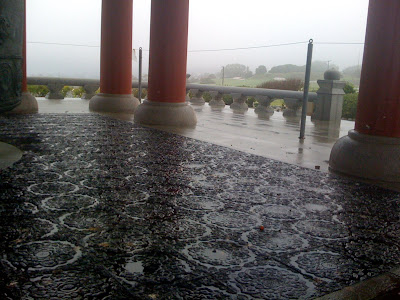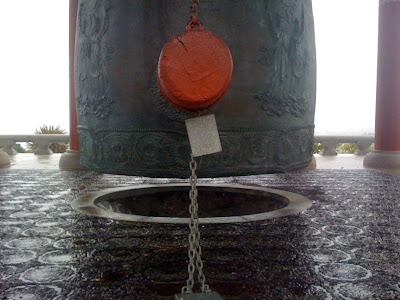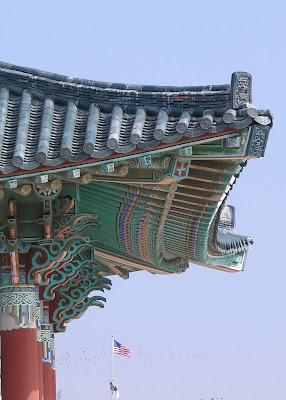





Rough Drafts from a Writer's Life
 Fifties Iron Lung Ward, from Google
Fifties Iron Lung Ward, from Google
 View from the front deck Dec. 18
View from the front deck Dec. 18









Sadly a memoir wasn't an option for me, because my youth had been tragically happy. Mom never had the foresight to hit me or set me to petty thieving or to enlist us in a survivalist cult. I wasn't even from the South, which wouldn've bought a few dozen pages. Lying wouldn't work; these days memoir police seem to emerge and make sure you truly had it bad. And the bar for bad is high -- reviewers have no patience for standrad-issue alcoholics and battered wives anymore.
When you think of the great writers, penning a novel seems terribly romantic. You think of F. Scott Fitzgerald, a Riviera breeze billowing his curtains and the sounds of the Cap d'Antibes street cut by the tapping of his typewriter, as he lacerates the rich and dreams of the past. Or Hemingway, in a hotel in Palmplona in the heat of the afternoon, as bullfighters take their siesta and drops of water bead on a bottle of kirsch. Or Joyce, squinting his Irish bead-eyes as he lends his classical training and his Gaelic imagination to summon up allusie rhythms and language dense and unfolding.
Even lesser novelists seem glamorous. Some scribbler burning twigs in a boardinghouse in the second arrondissemet as he dips his quill pen into the ink. Or a slim and shoeless thirty-something, taking a year off from his job as an alternatie marketing onsultant to sit in a park in Vancouver to Park Slope and type into his PowerBook a wry yet soulful take on the paradozes of hypermoderity.
That is all delusion. Writing a novel is pathetic and boring. Anyone sensible hates it. it's all you can do to not play Snood all afternoon.
 My ticket
My ticket How Could We Live Without Them?
How Could We Live Without Them? Disappearing Beauty
Disappearing Beauty I'm Scared of Clowns
I'm Scared of Clowns
 Boo Hoo. No Vote
Boo Hoo. No VoteBut for me, the highlight—if that's the word—of covering this campaign came when Clack and Walling momentarily joined forces at the Landmark Food Center, the kind of grocery store where a security guard roams the fluorescently lit aisles and customers are required to check their bags at the counter. Flanked by displays of breakfast cereal, the two candidates judged a Kool-Aid-making contest sponsored by three local churches.
 Part of a series (they're up to nine so far I think) on writing from the always wonderful Graywolf Press, Baxter's little six-chapter exploration examines issues of staging, the "subterranean," the unsaid, inflection and "face" in fiction. It's a bracing, refreshing discussion and I enjoyed it so thoroughly I decided to require my fiction students to buy it and read it in my upcoming fiction-writing class.
Part of a series (they're up to nine so far I think) on writing from the always wonderful Graywolf Press, Baxter's little six-chapter exploration examines issues of staging, the "subterranean," the unsaid, inflection and "face" in fiction. It's a bracing, refreshing discussion and I enjoyed it so thoroughly I decided to require my fiction students to buy it and read it in my upcoming fiction-writing class.  Charlie's the editor of the series, which also includes The Art of Attention: The Poet's Eye by Donald Revell, The Art of Time in Memoir: Then, Again by Sven Birkerts, and the newest, The Art of Syntax: Rhythm of Thought, Rhythm of Song by Warren Wilson College MFA Program matriarch Ellen Bryant Voigt.
Charlie's the editor of the series, which also includes The Art of Attention: The Poet's Eye by Donald Revell, The Art of Time in Memoir: Then, Again by Sven Birkerts, and the newest, The Art of Syntax: Rhythm of Thought, Rhythm of Song by Warren Wilson College MFA Program matriarch Ellen Bryant Voigt.  photo from the New York Times
photo from the New York TimesAlthough most airports seem to have been designed by committees made up of subcommittees, and are inevitably unattractive and unsightly, Los Angeles International has an exuberant ugliness all its own. The atmosphere of non-invitation is quite distinctive, as if the city's first representative, its airport, is already disgusted, perhaps even repelled, by the traveler. The recent arrival might well imagine that he has landed on the set of a low-budget futuristic film, most of whose main characters will die horribly within the first forty minutes. The pods, as they are called, are careless maintained, and an odor of perfumed urine wafts here and there through the bleary air.
...For such a famous place, known for its hospitality to louche celebrities of every stripe, the Fatal seemed rather drab, even seedy. It advertised its own cool indifference to everything by means of dim Art Deco lamps and shabby antique rugs. Indifference constituted its most prized form of discretion. To the left of the entryway sat an ice plant. A dusty standing pot with a sunlit cactus in it, close to the elevators, matched the ice plant for pur floral forlornness. They were emblems of four-star neglect. In front of me, and to the right of the front desk, was a brown Art Deco sofa that looked as if it could have used a thorough cleaning. Scandalized, I saw stains.
 Water in the teapot only -- hooray
Water in the teapot only -- hooray Four kinds of sweetener -- hooray
Four kinds of sweetener -- hooray Man, this breakfast needs a bra
Man, this breakfast needs a bra

 Mark Rothko
Mark Rothko Photo from the LA Times
Photo from the LA Times

